Emotional abuse is often mistaken for love by those who are trapped in cycles of abuse in a relationship. Trauma is surprisingly easy to overlook when the abuse masquerades as someone caring for you.
What is trauma bonding?
The definition of trauma bonding is “a strong emotional attachment between an abused person and his or her abuser, formed as a result of the cycle of violence.”
Trauma bonding is a term created by Patrick Carnes, a somewhat controversial figure in the field of addiction counseling. The term was created as a way to explain the emotional bond that develops between abuser and victim within the context of emotionally and physically abusive relationships (often, but not always, one involving a narcissist).
Trauma bonding occurs to many people trapped in abusive relationships who don’t realize they’re experiencing it. As mental and psychological abuse wears you down, you mistakenly come to associate feelings of trauma with love.
Read Traumatic Bonding: How A Narcissistic Relationship Is Similar To Stockholm Syndrome
What does trauma bonded mean?
Trauma bonding is defined as a psychological response to abuse that occurs when the abused person forms an unhealthy bond with the abuser.
The person who is experiencing the abuse over time may develop a sort of sympathy for their abuser, which is developed after a long repeating cycle of abuse followed by remorse, as the abuser somehow alternates abuse with positive experiences.
Stockholm syndrome is one form of trauma bonding that is used to explain how the person being abused can develop positive associations with their captors or abusers.
What are signs of trauma bonding in abusive relationships?
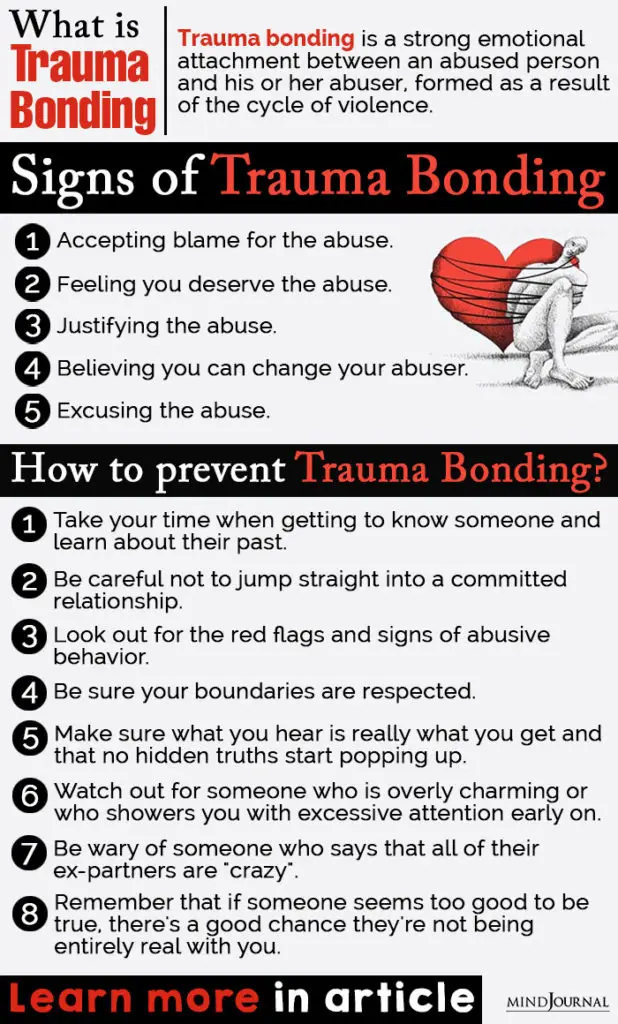
1. Accepting blame for the abuse: “He didn’t mean to get angry. It was my fault.”
2. Feeling you deserve the abuse: “He puts up with me and still loves me.”
3. Justifying the abuse: “He had a terrible childhood. I feel sorry for him.”
4. Believing you can change your abuser: “I can help him to change with love and support.”
5. Excusing the abuse: “He deserves a fair go. He doesn’t mean to hurt me.”
Notice how the abuser’s behavior is always justified and the victim blames themselves as if the abuse is their own fault.
This is how victims of trauma bonding minimize and deny the abuse they’re enduring in order to uphold the positive image of the abuser, while distorting the reality and being misguided by fantasy love they desperately want to be believe is real love.
When you are so desperately long to be loved, you can easily become drawn to an abusive relationship and misread the signs as love instead of abuse. But how do you know if you’re truly in love or are just caught in a blinding fantasy due to trauma bonding?
Read Trauma Bonding: Why We Stay In Abusive Relationships
Is it love or trauma bonding?
Have you ever fallen in love hard and fast, only for it to come crashing down in the grim reality of abusive behavior? Did you then feel surprised that it was so hard to break away from such a toxic relationship?
Real love doesn’t usually hit so hard, so fast. Real love is steady and grows slowly as you get to know someone on deeper and deeper levels.
In contrast, becoming attached to someone through a trauma bond can feel magnetic and captivating, but it is not real love; it’s attachment formed through trying to feel in unhealed emotional wounds.
Take trauma bonding with a narcissist, for example. Trauma bonding with a narcissist means the narcissist makes you think that by repeating this abusive cycle, they can fuel your needs of validation and love, and make you believe what they are doing to you is normal.
Do narcissists feel the trauma bond? Narcissists only feel the power of manipulation from trauma bonding, as it’s an addiction to them. However, they don’t feel the actual trauma bond because their theory is if they don’t feel, others can’t hurt them.
A narcissist may also become abusive and form a habit of trauma bonding as a consequence of traumatization from their upbringing or past relationships.
Vulnerability to trauma bonding often stems from insecure attachments created during repeated abusive or traumatic childhood experiences with a caregiver. This relationship pattern becomes internalized as a learned pattern of behavior that carries into your relationships as an adult.
If you experienced abuse from a primary caregiver when you were a child, you likely learned to associate love with abuse. This became the template for how you learned to relate to others and form relationships.
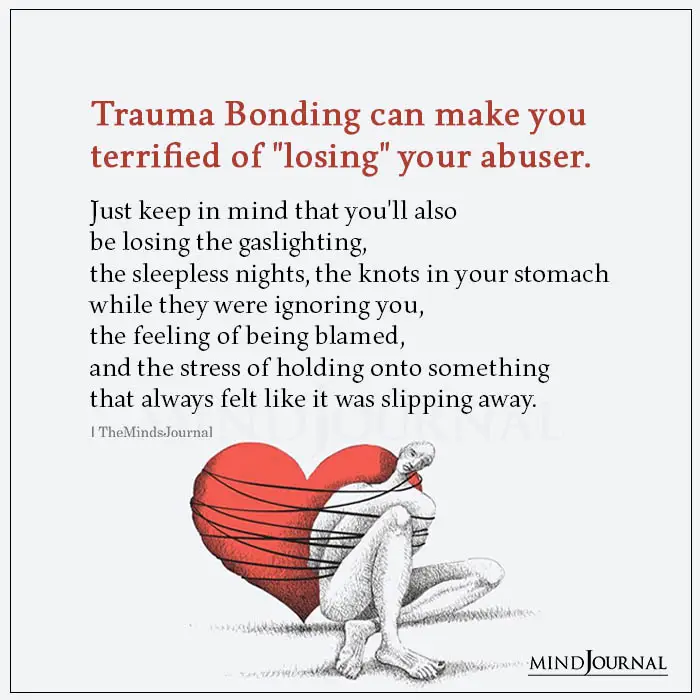
What does a trauma bond feel like?
You expect that in order to feel loved, you must also be abused — that’s just how it works.
For example, if you were abused for being noncompliant as a child, you were likely left feeling abandoned and unworthy. In order to attach to your abuser, you learned to meet their needs and make them happy so you could receive love and approval. Over time, this became your basic equation for love.
If you were abused as child, you protected your relationship with your abusive parent by preserving your vision of them as a “good” parent, pushing down your feelings of anger or hurt to feel loved, safe, and attached.
You protected yourself by burying these feelings, and convincing yourself that there must be something wrong with you for being upsetting to your parent. You came to believe that it was all your fault — you are bad, you are naughty, and you must make it up if you want to be “good enough” to deserve their love.
Read 4 Ways You Can Heal Trauma Bond After a Narcissistic Relationship
What causes a trauma bond?
This coping mechanism became the template for how you see yourself in relationships as an adult.
You see yourself as bad and deserving of punishment, so you must be good to get the love you want. In essence, you are still longing for your abusive father or mother to give you the lost love you wanted, repeating the self-destructive pattern with abusive partners as you desperately fight to get them to love you.
When you feel as though you’re not good enough, your desire for love can be the perfect bait for an abusive narcissist to hook onto. When you’re meeting all their needs, you feel loved and good enough, allowing you both to see their abuse as justified.
As you justify or minimize the abuse and blame yourself for it, you remain in denial about the fact that you are being abused — just as you did as a child.
Acknowledging abuse creates a fear of abandonment, awakening your original pain. This pushes you to further defend and protect yourself by digging deeper into denial and self-blame.
Facing reality and letting go of the fantasy that you are being truly loved stirs your fear of abandonment, along with your associated feelings of not being good enough. You reenact the same attachment pattern you first learned with your abusive parent and cannot let go of the abuser. Instead, you believe you must figure out how to be good enough to get them back.
Victims of abuse will go back to their abusers over and over, justifying it this way every time as the trauma wounds bind them tighter together.
How do you break a trauma bond?
The first step in breaking a trauma bond is to recognize that it’s happening, notice it and put a name to it.
Sometimes, you may need to be extra diligent and pay attention to the signs and patterns of abuse, and write them down so you can recognize and distinguish love from abusive and hurt. You should also write down whatever your partner says or does to excuse the abuse.
It also helps to look at the relationship as if you were viewing it from another perspective. The most important thing is to talk to loved ones like your friends and family, people who actually support you and take care of you, and avoid self-blame.
Once you’re ready to leave your partner, do so completely by cutting off any and all forms of contact. If you are finding it hard to break free, you may need to seek professional help, in which case the National Domestic Violence Hotline offers free and confidential support.
How can you prevent yourself from trauma bonding with someone who is emotionally abusive?
There are a few steps you can take. Remember: your safety and mental well-being are the most important thing.
1. Always take your time when getting to know someone and learn about their past.
2. Be careful not to jump straight into a committed relationship just because things feel good and exciting.
3. Look out for the red flags and signs of abusive behavior, such as feeling pressured, controlled, or belittled.
4. Be sure your boundaries are respected. If they aren’t, don’t take things any further.
5. Make sure what you hear is really what you get and that no hidden truths start popping up with excuses.
6. Watch out for someone who is overly charming or who showers you with excessive attention early on.
7. Be wary of someone who says that all of their ex-partners are “crazy,” feels nothing in their past was their fault, or who sees themselves as a passive victim.
8. Remember that if someone seems too good to be true, there’s a good chance they’re not being entirely authentic with you.
Read 5 Signs You Are In A Trauma Bond
Don’t confuse trauma bonding with real love; it will blind you.
True love is not abusive. You shouldn’t need to jump through hoops with someone in order for a relationship to fit into your fantasy version of what being loved should look like.
Real love is not conditional upon pleasing someone. Real love means feeling loved while expressing yourself authentically, dealing with the ups and downs of life, and seeing each other for who you each really are.
Obtaining self-love means letting go of any remaining ties to an abusive parent or partner so you can free yourself from the dysfunctional attachment pattern of seeking love and approval in order to feel good enough.
Truly loving yourself means engaging in self-care and protecting yourself from abuse so you can be yourself and feel loved for the real person you are.
Written by Nancy Carbone Originally appeared in YourTango
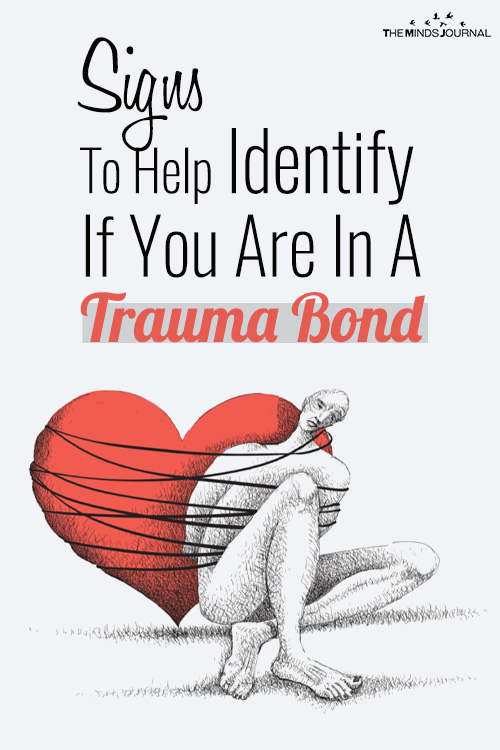
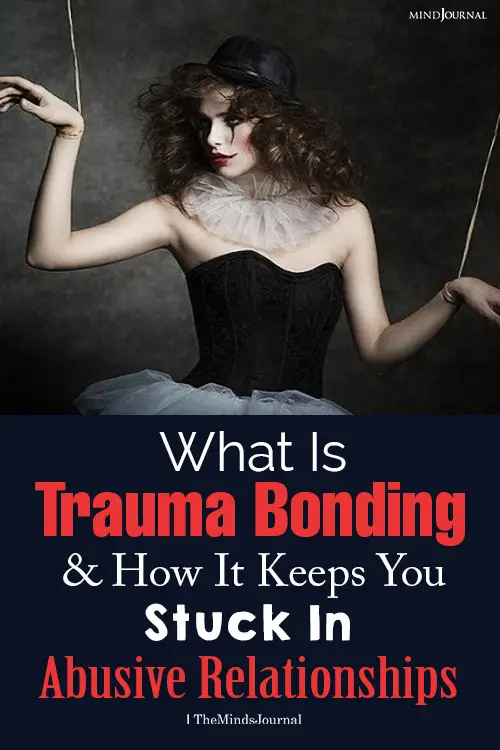
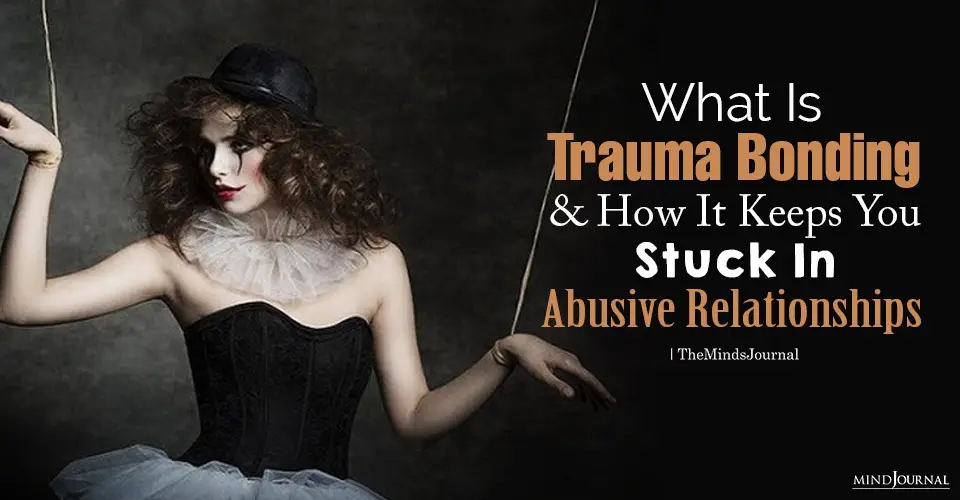







Leave a Reply
You must be logged in to post a comment.